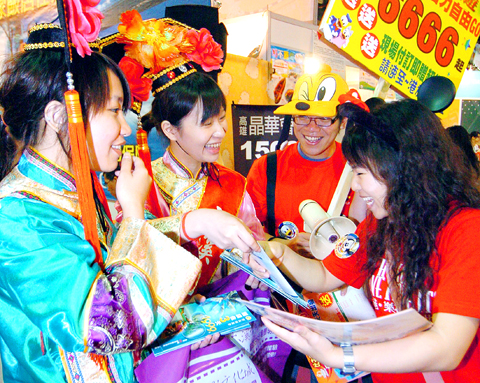A shortage of five-star hotels in Taiwan may pose a problem for plans to open the country to Chinese tourists in July, a Taipei Association of Travel Agents (台北市旅行商業同業公會) said yesterday.
As president-elect Ma Ying-jeou (馬英九) has promised to begin weekend cross-strait charter flights and allow Chinese tourists to visit Taiwan, local travel agencies are concerned the number of hotel rooms would not meet demand.
“The lack of five-star hotels in places outside of major cities in Taiwan is the biggest challenge facing the nation’s tourism industry,” Peter Ting (丁萊), assistant chairman of the Taipei Association of Travel Agents, said yesterday at the 2008 Taiwan Tourism Exposition (台灣觀光博覽會).

PHOTO: LIAO CHEN-HUEI, TAIPEI TIMES
One way to resolve the problem would be for travel agencies to break the Chinese tour groups into smaller groups and put them in different hotels of the same quality, Ting said.
Phoenix Tours International Inc (鳳凰國際旅行社) — the only travel agency in Taiwan listed on the over-the-counter (OTC) market GRETAI Securities Market — said it would arrange for Chinese tourists to stay at hotels of the same quality level in towns outside tourist destinations, as the lack of hotels cannot be solved in the short-term.
It also plans to arrange for tour groups to visit popular sites, such as Sun Moon Lake, Alishan and East Rift Valley, during the week and major cities on weekends in a bid to avoid a room shortage, said Benjamin Pien (卞傑民), executive general manager of Phoenix Tours International’s commercial and direct sales department.
Taipei-based Lion Travel Service Co (雄獅旅行社) said it was looking forward to the Chinese tourism business, even though the Chinese tourist market is rather small.
“Compared with the 103.8 million people annual domestic market [in Taiwan], 1 million Chinese tourists is relatively small,” said Andy Huang (黃信川), deputy general manager of Lion Travel Service’s integrated marketing division.

A proposed 100 percent tariff on chip imports announced by US President Donald Trump could shift more of Taiwan’s semiconductor production overseas, a Taiwan Institute of Economic Research (TIER) researcher said yesterday. Trump’s tariff policy will accelerate the global semiconductor industry’s pace to establish roots in the US, leading to higher supply chain costs and ultimately raising prices of consumer electronics and creating uncertainty for future market demand, Arisa Liu (劉佩真) at the institute’s Taiwan Industry Economics Database said in a telephone interview. Trump’s move signals his intention to "restore the glory of the US semiconductor industry," Liu noted, saying that

On Ireland’s blustery western seaboard, researchers are gleefully flying giant kites — not for fun, but in the hope of generating renewable electricity and sparking a “revolution” in wind energy. “We use a kite to capture the wind and a generator at the bottom of it that captures the power,” said Padraic Doherty of Kitepower, the Dutch firm behind the venture. At its test site in operation since September 2023 near the small town of Bangor Erris, the team transports the vast 60-square-meter kite from a hangar across the lunar-like bogland to a generator. The kite is then attached by a

Foxconn Technology Co (鴻準精密), a metal casing supplier owned by Hon Hai Precision Industry Co (鴻海精密), yesterday announced plans to invest US$1 billion in the US over the next decade as part of its business transformation strategy. The Apple Inc supplier said in a statement that its board approved the investment on Thursday, as part of a transformation strategy focused on precision mold development, smart manufacturing, robotics and advanced automation. The strategy would have a strong emphasis on artificial intelligence (AI), the company added. The company said it aims to build a flexible, intelligent production ecosystem to boost competitiveness and sustainability. Foxconn

STILL UNCLEAR: Several aspects of the policy still need to be clarified, such as whether the exemptions would expand to related products, PwC Taiwan warned The TAIEX surged yesterday, led by gains in Taiwan Semiconductor Manufacturing Co (TSMC, 台積電), after US President Donald Trump announced a sweeping 100 percent tariff on imported semiconductors — while exempting companies operating or building plants in the US, which includes TSMC. The benchmark index jumped 556.41 points, or 2.37 percent, to close at 24,003.77, breaching the 24,000-point level and hitting its highest close this year, Taiwan Stock Exchange (TWSE) data showed. TSMC rose NT$55, or 4.89 percent, to close at a record NT$1,180, as the company is already investing heavily in a multibillion-dollar plant in Arizona that led investors to assume